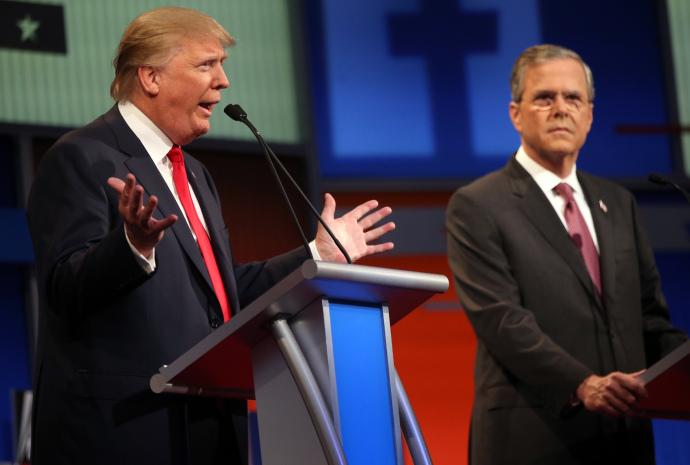Photo by Peter Stevens
Missed the debate? Here is a review of the major points.
Kiki Fann | Staff Reporter
The day before the third Republican presidential debate, the New York Times posted an article titled “CNBC May Be the Bigger Winner of the Next Republican Debate.” It made sense: a mostly financial channel was moving into politics—the debate focused on economic issues—and the popularity of the past debates seemed to promise a plethora of new viewers. But, boy, how wrong they were.
Perhaps the best indicator of CNBC’s public failure was the Republican National Committee’s (RNC) reaction following the debate. Chairman Reince Priebus wrote an open letter to NBC News, suspending a February debate on NBC because the CNBC debate had been conducted in “bad faith.”
“What took place Wednesday night was not an attempt to give the American people a greater understanding of our candidates’ policies and ideas,” Priebus wrote. “[It was] a series of ‘gotcha’ questions, petty and mean-spirited in tone, and designed to embarrass our candidates.”
The night began with a moderator asking Donald Trump if he were running a “comic book” campaign, and many of the following questions were ad hominem attacks following this logic: you did this bad thing, why should people still vote for you? Ted Cruz was the first to capitalize on these questions, thundering “the questions that have been asked so far illustrate why the media is the problem” to resounding cheers. Chris Christie later followed the same train of thought, telling a moderator that his question was rude “even in New Jersey.”
——
But, to me, the RNC’s bluster, canceling the future debate, and the candidates’ loud complaints about the questions only served to mask several of the candidates’ underlying issues. Ben Carson, the current leader in the polls, was asked about his “flat tax,” or “tithing,” as he calls it, tax plan, and he gave an extremely unsatisfactory answer. He flat out ignored the moderator’s concerns about his plan—her statistics indicated that it was extremely unfeasible—electing to instead tell her “when we put down all the facts, it will work out” and then proceeding to lay down none of the facts.
John Kasich capitalized upon Carson’s vague and weak response, calling it “empty promises.” Then he took a larger shot at both Trump and Carson, saying “this stuff is fantasy” and “we cannot elect somebody who does not know how to do the job.” To me, Kasich is the most realistic candidate, and the one, if I had to, that I would vote for. But Trump offers more star power, and on the stage he responded to Kasich by saying “[Kasich’s] polls tanked so he turned nasty.” It seems that Trump justifies everything by referencing how well he is doing in the polls, and now that he is slightly trailing Carson I’m interested to hear what kind of real support he will give.
Marco Rubio was widely regarded as the winner of the debate, and I agree. He deftly put down a rather half-hearted joust from Jeb Bush; Bush attacked him about all of the Senate votes he has missed while campaigning for president—something he almost certainly got from a widely read Sun Sentinel editorial—and Rubio responded by saying “somebody has convinced you [Jeb] that attacking me is going to help you. My campaign is going to be about the future of America, it’s not going to be about attacking anyone else on this stage.” It furthered the image of Bush as some kind of meek pretender, an image furthered by the fact that he is using many of his brother’s advisers and often seems to pose rather forced challenges to his opponents. Rubio’s “someone has convinced you” was, to me, a powerful bit of rhetoric that noticeably wilted Bush onstage.
If Rubio was the clear-cut winner, Bush was the loser. Many have pegged him as the loser of each of the debates, and the once perceived “front-runner” now languishes with 4% support.
—-
To get back to the issue with CNBC, however, I saw the candidates’ angry show about the questions as a disturbing continuation of recent Republican politics and an off-putting sign for the eventual candidate’s success in the presidential elections. During Barack Obama’s presidency, the Republicans have largely been the party of “no” — most famously, Mitch McConnell said in 2012 that the “number one priority is to deny President Obama a second term.” They threaten government shutdowns—one over the new fiscal bill was a worry—and sometimes the ensuing image is of a party willing to sacrifice the nation’s prosperity for the sake of politics.
Yes, the questions were bad, but so were the answers. The Republican presidential candidates need to get it together—instead of complaining about what is wrong, they need to decide how they are going to fix things—before the election, or Hillary Clinton (or perhaps Bernie Sanders) is going to have a rather relaxing, bluster-free time of things.








